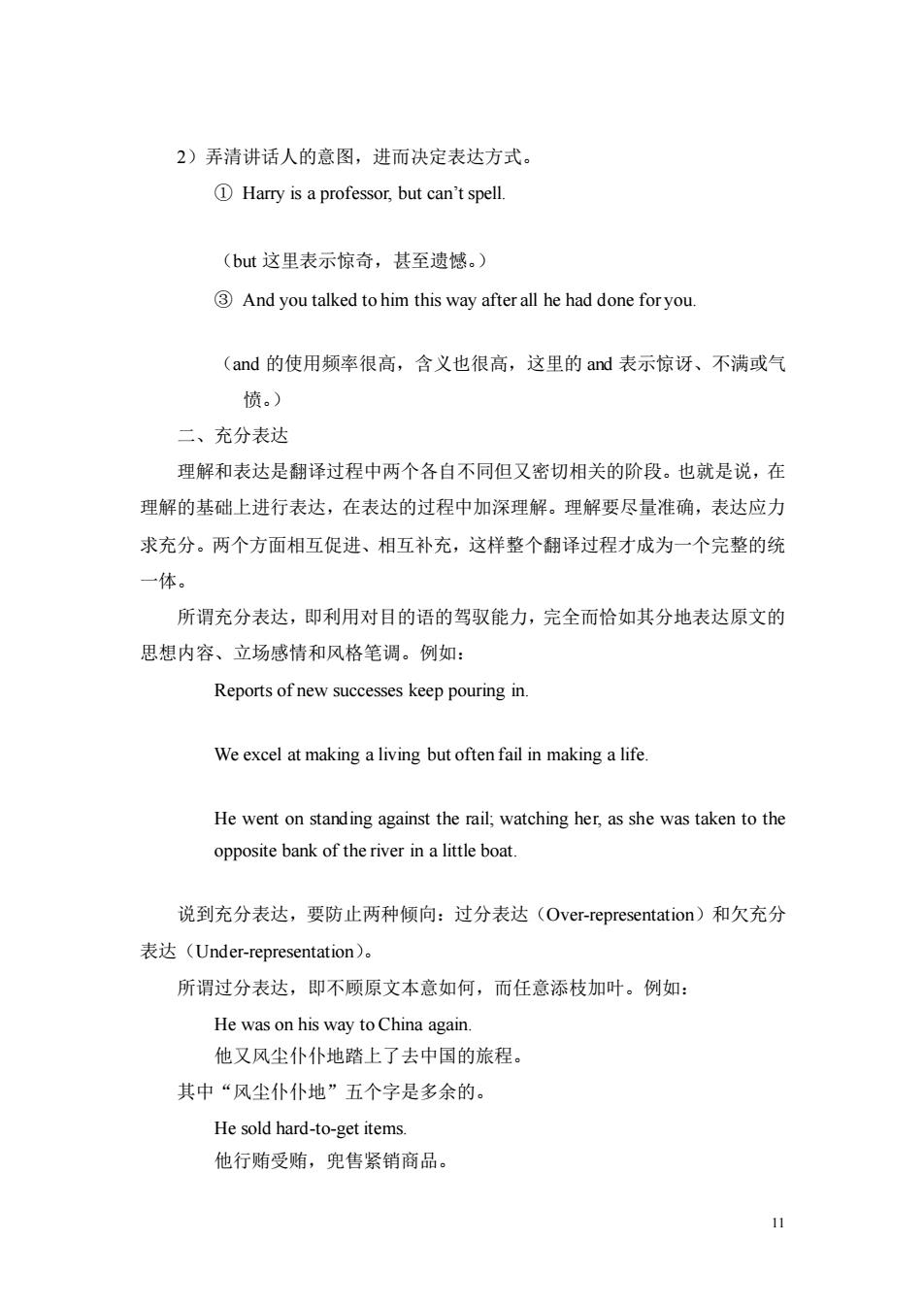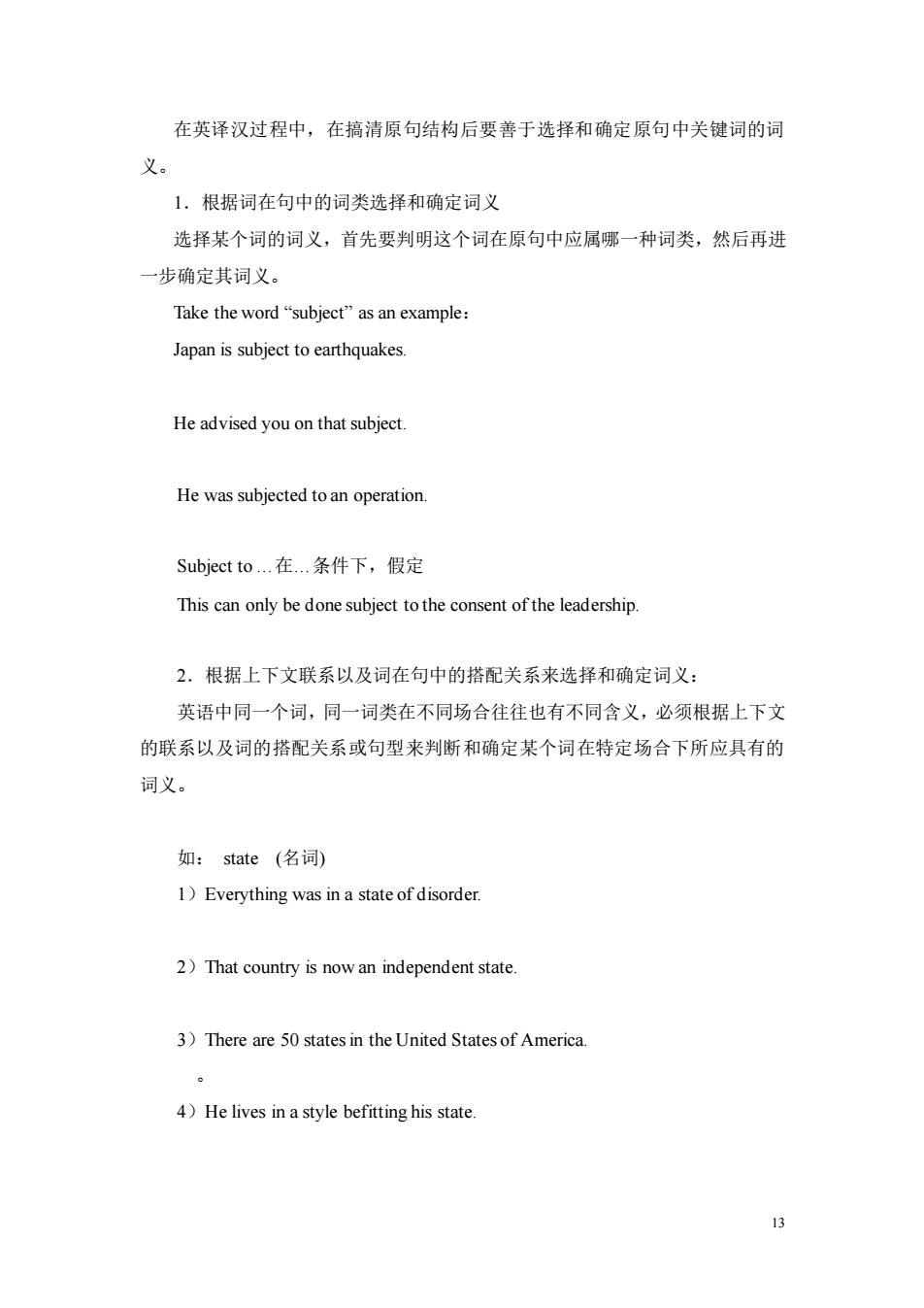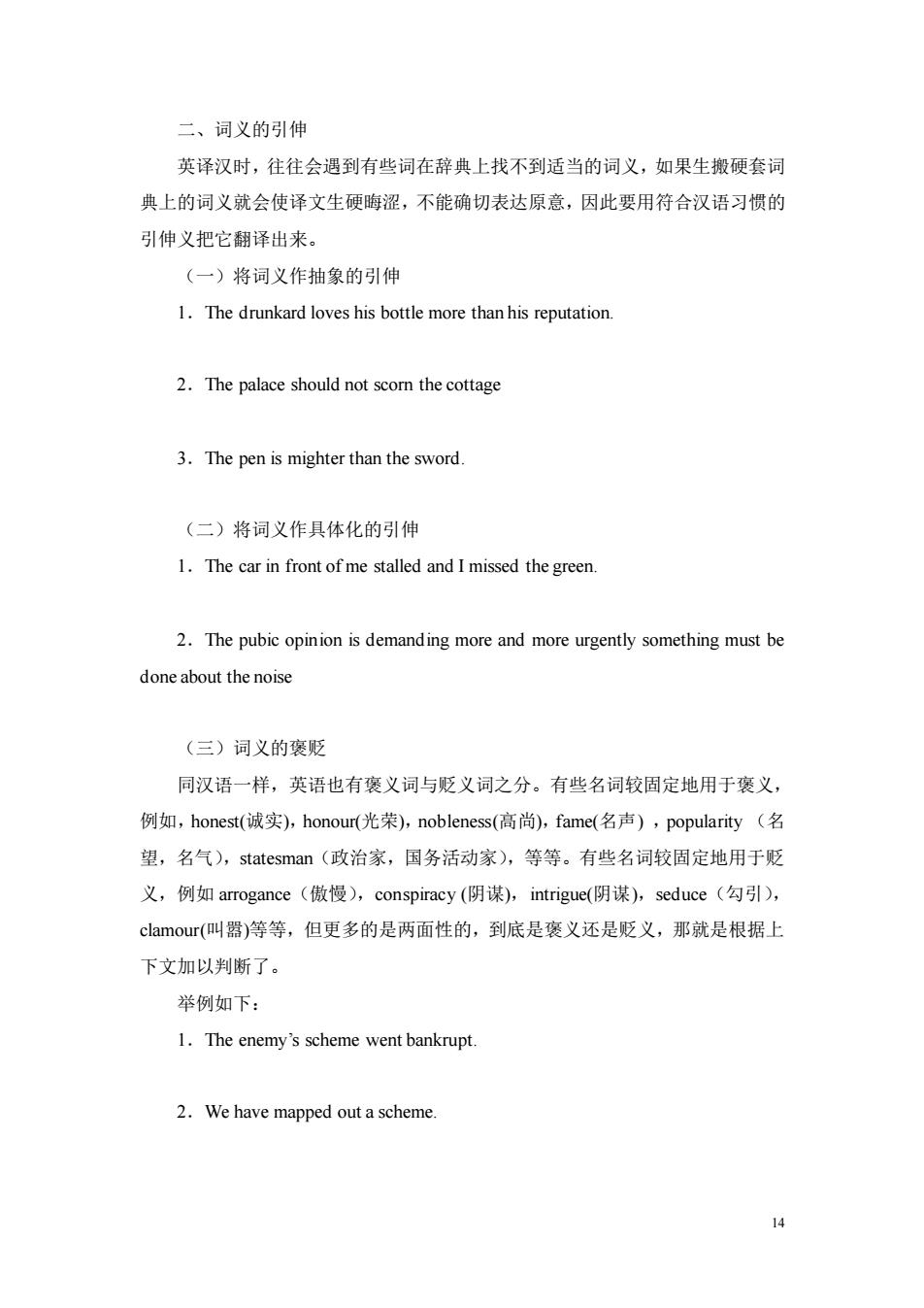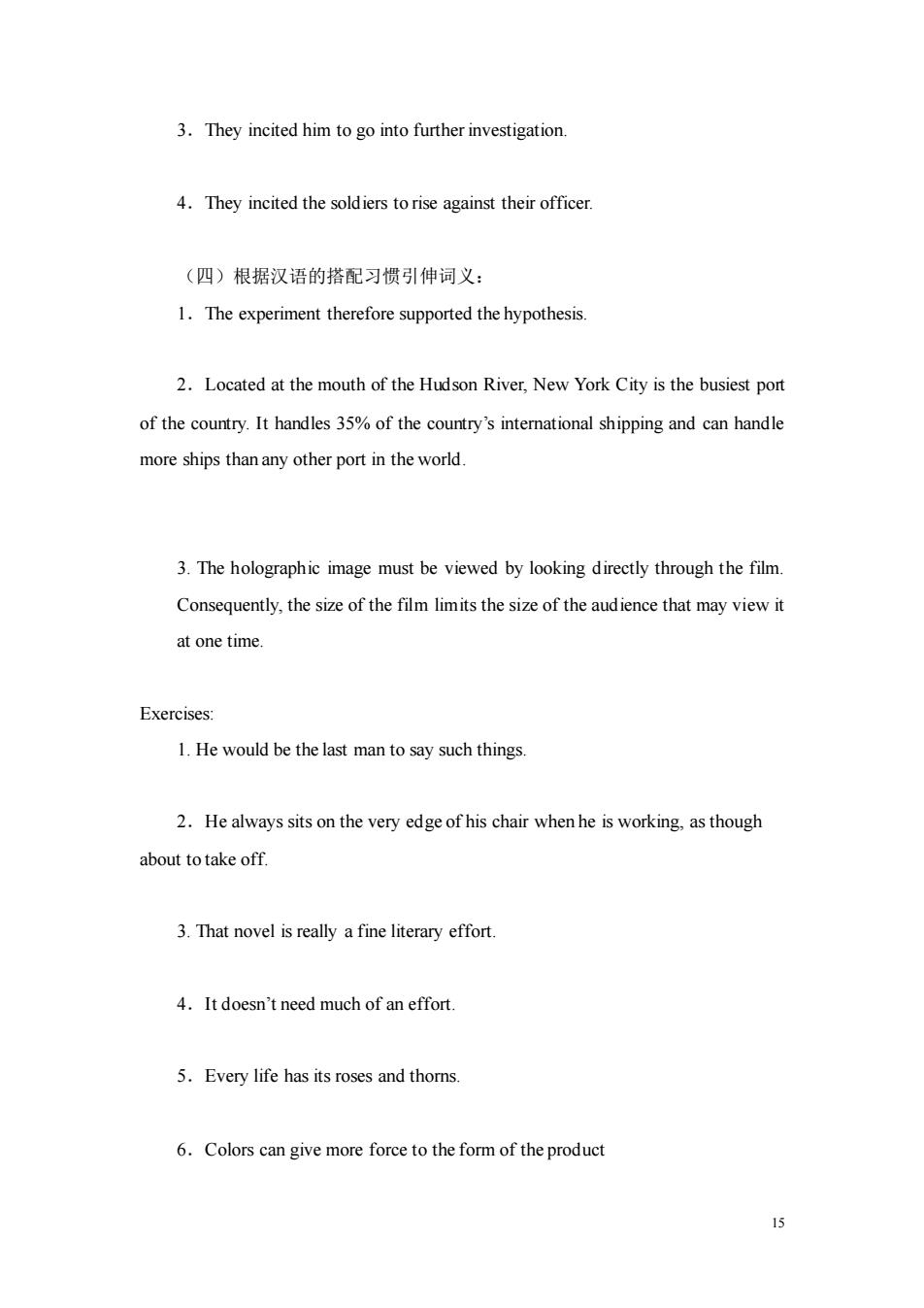
2)弄清讲话人的意图,进而决定表达方式。 1 Harry is a professor,but can't spell. (but这里表示惊奇,甚至遗憾。) 3 And you talked to him this way after all he had done for you (and的使用频率很高,含义也很高,这里的and表示惊讶、不满或气 愤。) 二、充分表达 理解和表达是翻译过程中两个各自不同但又密切相关的阶段。也就是说,在 理解的基础上进行表达,在表达的过程中加深理解。理解要尽量准确,表达应力 求充分。两个方面相互促进、相互补充,这样整个翻译过程才成为一个完整的统 一体。 所谓充分表达,即利用对目的语的驾驭能力,完全而恰如其分地表达原文的 思想内容、立场感情和风格笔调。例如: Reports of new successes keep pouring in. We excel at making a living but often fail in making a life. He went on standing against the rail;watching her,as she was taken to the opposite bank of the river in a little boat. 说到充分表达,要防止两种倾向:过分表达(Over-representation)和欠充分 表达(Under-representation)。 所谓过分表达,即不顾原文本意如何,而任意添枝加叶。例如: He was on his way to China again 他又风尘仆仆地踏上了去中国的旅程。 其中“风尘仆仆地”五个字是多余的。 He sold hard-to-get items 他行贿受贿,兜售紧销商品。 11
11 2)弄清讲话人的意图,进而决定表达方式。 ① Harry is a professor, but can’t spell. (but 这里表示惊奇,甚至遗憾。) ③ And you talked to him this way after all he had done for you. (and 的使用频率很高,含义也很高,这里的 and 表示惊讶、不满或气 愤。) 二、充分表达 理解和表达是翻译过程中两个各自不同但又密切相关的阶段。也就是说,在 理解的基础上进行表达,在表达的过程中加深理解。理解要尽量准确,表达应力 求充分。两个方面相互促进、相互补充,这样整个翻译过程才成为一个完整的统 一体。 所谓充分表达,即利用对目的语的驾驭能力,完全而恰如其分地表达原文的 思想内容、立场感情和风格笔调。例如: Reports of new successes keep pouring in. We excel at making a living but often fail in making a life. He went on standing against the rail; watching her, as she was taken to the opposite bank of the river in a little boat. 说到充分表达,要防止两种倾向:过分表达(Over-representation)和欠充分 表达(Under-representation)。 所谓过分表达,即不顾原文本意如何,而任意添枝加叶。例如: He was on his way to China again. 他又风尘仆仆地踏上了去中国的旅程。 其中“风尘仆仆地”五个字是多余的。 He sold hard-to-get items. 他行贿受贿,兜售紧销商品

其中“行贿受贿”四个字属无中生有,“兜售”一般被视为贬义词,而原文 没有明显的贬褒之分。建议改译: 所谓欠充分表达,即或任意删减,或不问作者感情态度,或不计文体风格, 等等。例如: When we were in port,my crew was responsible for moving,installing and modifying the items to be tested the next week.To compound the problems, our good ship Wyoming was declared to be unsafe 原译: 进港后,船员们负责搬运、安装、调试仪器和设备,迎接下星期的 试验。就在此关键时刻,我们的“怀俄明”号被宣布为不安全。 原文有两处漏译:To compound the problems(使问题复杂化)和good(好 端端的)。建议改译: 第二章 英译汉常用的方法和技巧 第一单元 第一节词义的选择 英文和中文一样,一词一义的情况是很少的。那主要是一些不常用的或专业 性很强的词,如:stot=小雄牛,statics=-静力学,radiobidogy=放射性生物学。越 是常用的词释义越多,而词与词结合起来,又衍生出许多新词义,就拿cary这 个词来说,在稍稍完备的词典里就标明有动词和名词两种用法,其释义约有七八 十种,如运送,传播,携带等等,实际翻译时可能译成的中文词语要远远超过词 典里收进的释义。Carry与其它词结合在一起,意思就更多了。 Carry away-=带走,也有“令人神魂颠倒”的意思。Carry back=拿回来,令人 想起,carry off with a laugh=置之一笑,carry the day-=打胜,占优势,carry the house=:博得满堂喝彩,等等。cary这个词在英语中还不是释义最多的一种,比 它释义多的词语有的是,例如:un,make,go,put等等。 词义就是该词在语言中的使用。每个词在新的语言环境中使用时,就是一个 新词。英国文学家丁·斯威夫特说:“文风的真谛就是把适当的词放在适当的地 方”。 12
12 其中“行贿受贿”四个字属无中生有,“兜售”一般被视为贬义词,而原文 没有明显的贬褒之分。建议改译: 所谓欠充分表达,即或任意删减,或不问作者感情态度,或不计文体风格, 等等。例如: When we were in port, my crew was responsible for moving, installing and modifying the items to be tested the next week. To compound the problems, our good ship Wyoming was declared to be unsafe. 原译: 进港后,船员们负责搬运、安装、调试仪器和设备,迎接下星期的 试验。就在此关键时刻,我们的“怀俄明”号被宣布为不安全。 原文有两处漏译:To compound the problems(使问题复杂化)和 good(好 端端的)。建议改译: 第二章 英译汉常用的方法和技巧 第一单元 第一节 词义的选择 英文和中文一样,一词一义的情况是很少的。那主要是一些不常用的或专业 性很强的词,如:stot=小雄牛,statics=静力学,radiobidogy=放射性生物学。越 是常用的词释义越多,而词与词结合起来,又衍生出许多新词义,就拿 carry 这 个词来说,在稍稍完备的词典里就标明有动词和名词两种用法,其释义约有七八 十种,如运送,传播,携带等等,实际翻译时可能译成的中文词语要远远超过词 典里收进的释义。Carry 与其它词结合在一起,意思就更多了。 Carry away=带走,也有“令人神魂颠倒”的意思。Carry back=拿回来,令人 想起,carry off with a laugh=置之一笑,carry the day=打胜,占优势,carry the house=博得满堂喝彩,等等。carry 这个词在英语中还不是释义最多的一种,比 它释义多的词语有的是,例如:run, make, go, put 等等。 词义就是该词在语言中的使用。每个词在新的语言环境中使用时,就是一个 新词。英国文学家丁·斯威夫特说:“文风的真谛就是把适当的词放在适当的地 方

在英译汉过程中,在搞清原句结构后要善于选择和确定原句中关键词的词 义 1.根据词在句中的词类选择和确定词义 选择某个词的词义,首先要判明这个词在原句中应属哪一种词类,然后再进 一步确定其词义。 Take the word“subject'”as an example: Japan is subject to earthquakes. He advised you on that subject. He was subjected to an operation. Subject to.在.条件下,假定 This can only be done subject to the consent of the leadership. 2.根据上下文联系以及词在句中的搭配关系来选择和确定词义: 英语中同一个词,同一词类在不同场合往往也有不同含义,必须根据上下文 的联系以及词的搭配关系或句型来判断和确定某个词在特定场合下所应具有的 词义。 如:state(名词) 1)Everything was in a state of disorder. 2)That country is now an independent state. 3)There are 50 states in the United States of America. 4)He lives in a style befitting his state. 3
13 在英译汉过程中,在搞清原句结构后要善于选择和确定原句中关键词的词 义。 1.根据词在句中的词类选择和确定词义 选择某个词的词义,首先要判明这个词在原句中应属哪一种词类,然后再进 一步确定其词义。 Take the word “subject” as an example: Japan is subject to earthquakes. He advised you on that subject. He was subjected to an operation. Subject to .在.条件下,假定 This can only be done subject to the consent of the leadership. 2.根据上下文联系以及词在句中的搭配关系来选择和确定词义: 英语中同一个词,同一词类在不同场合往往也有不同含义,必须根据上下文 的联系以及词的搭配关系或句型来判断和确定某个词在特定场合下所应具有的 词义。 如: state (名词) 1)Everything was in a state of disorder. 2)That country is now an independent state. 3)There are 50 states in the United States of America. 。 4)He lives in a style befitting his state

二、词义的引伸 英译汉时,往往会遇到有些词在辞典上找不到适当的词义,如果生搬硬套词 典上的词义就会使译文生硬晦涩,不能确切表达原意,因此要用符合汉语习惯的 引伸义把它翻译出来。 (一)将词义作抽象的引伸 1.The drunkard loves his bottle more than his reputation. 2.The palace should not scorn the cottage 3.The pen is mighter than the sword. (二)将词义作具体化的引伸 1.The car in front of me stalled and I missed the green. 2.The pubic opinion is demanding more and more urgently something must be done about the noise (三)词义的褒贬 同汉语一样,英语也有褒义词与贬义词之分。有些名词较固定地用于褒义, 例如,honest(诚实),honour(光荣),nobleness(高尚),fame(名声),popularity(名 望,名气),statesman(政治家,国务活动家),等等。有些名词较固定地用于贬 义,例如arrogance(傲慢),conspiracy(阴谋),intrigue(阴谋),seduce(勾引), clamour(叫嚣)等等,但更多的是两面性的,到底是褒义还是贬义,那就是根据上 下文加以判断了。 举例如下: 1.The enemy's scheme went bankrupt. 2.We have mapped out a scheme
14 二、词义的引伸 英译汉时,往往会遇到有些词在辞典上找不到适当的词义,如果生搬硬套词 典上的词义就会使译文生硬晦涩,不能确切表达原意,因此要用符合汉语习惯的 引伸义把它翻译出来。 (一)将词义作抽象的引伸 1.The drunkard loves his bottle more than his reputation. 2.The palace should not scorn the cottage 3.The pen is mighter than the sword. (二)将词义作具体化的引伸 1.The car in front of me stalled and I missed the green. 2.The pubic opinion is demanding more and more urgently something must be done about the noise (三)词义的褒贬 同汉语一样,英语也有褒义词与贬义词之分。有些名词较固定地用于褒义, 例如,honest(诚实),honour(光荣),nobleness(高尚),fame(名声) ,popularity (名 望,名气),statesman(政治家,国务活动家),等等。有些名词较固定地用于贬 义,例如 arrogance(傲慢),conspiracy (阴谋),intrigue(阴谋),seduce(勾引), clamour(叫嚣)等等,但更多的是两面性的,到底是褒义还是贬义,那就是根据上 下文加以判断了。 举例如下: 1.The enemy’s scheme went bankrupt. 2.We have mapped out a scheme

3.They incited him to go into further investigation. 4.They incited the soldiers to rise against their officer. (四)根据汉语的搭配习惯引伸词义: 1.The experiment therefore supported the hypothesis. 2.Located at the mouth of the Hudson River,New York City is the busiest port of the country.It handles 35%of the country's international shipping and can handle more ships than any other port in the world. 3.The holographic image must be viewed by looking directly through the film. Consequently,the size of the film limits the size of the aud ience that may view it at one time. Exercises: 1.He would be the last man to say such things. 2.He always sits on the very edge of his chair when he is working,as though about to take off. 3.That novel is really a fine literary effort. 4.It doesn't need much of an effort. 5.Every life has its roses and thorns. 6.Colors can give more force to the form of the product 15
15 3.They incited him to go into further investigation. 4.They incited the soldiers to rise against their officer. (四)根据汉语的搭配习惯引伸词义: 1.The experiment therefore supported the hypothesis. 2.Located at the mouth of the Hudson River, New York City is the busiest port of the country. It handles 35% of the country’s international shipping and can handle more ships than any other port in the world. 3. The holographic image must be viewed by looking directly through the film. Consequently, the size of the film limits the size of the audience that may view it at one time. Exercises: 1. He would be the last man to say such things. 2.He always sits on the very edge of his chair when he is working, as though about to take off. 3. That novel is really a fine literary effort. 4.It doesn’t need much of an effort. 5.Every life has its roses and thorns. 6.Colors can give more force to the form of the product